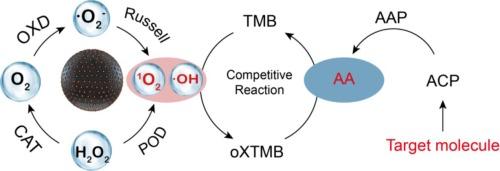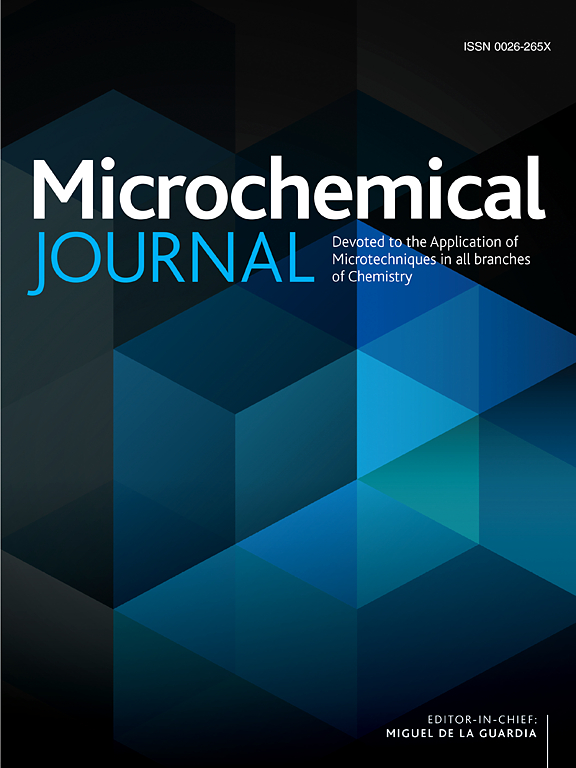用于快速检测酸性磷酸酶的工程纳米酶级联催化反应
IF 4.9
2区 化学
Q1 CHEMISTRY, ANALYTICAL
引用次数: 0
摘要
利用人工多酶催化的级联反应对生物传感器大有裨益。本研究提出了一种由掺杂锰离子的空心碳纳米球(Mn@HCNs)组成的新型纳米反应器,它能迅速将分子信息转化为易于理解的比色信号。Mn@HCNs 纳米反应器用于检测 0.5-10 mU/mL 范围内的酸性磷酸酶(ACP),检测限低至 0.0851 mU/mL。与传统的 ACP 检测方法相比,我们的纳米反应器的优越性在于其对底物的超强亲和力以及 Mn@HCNs 的多酶行为。特别是,Mn@HCNs 的比 POD 样活性(SA)值优于大多数报道的 Fe3O4 和其他单原子酶。此外,该纳米反应器对蛋白质和离子的干扰具有优异的选择性,并进一步用于检测临床血清样本中的 ACP。这项工作可能会拓展人工多酶催化级联反应在分子生物传感器和临床应用方面的发展。本文章由计算机程序翻译,如有差异,请以英文原文为准。

Engineered nanozyme-cascade catalyzed reaction for rapid acid phosphatase detection
The utilization of artificial multienzyme-catalyzed cascade reactions have greatly benefited biosensors. This study presents a novel nanoreactor consisting of manganese ions-doped hollow carbon nanospheres (Mn@HCNs), which can rapidly transform molecular information into an easily comprehensible colorimetric signal. The Mn@HCNs nanoreactor was utilized to detect acid phosphatase (ACP) within a range of 0.5–10 mU/mL, achieving a limit of detection (LOD) as low as 0.0851 mU/mL. The superiority of our nanoreactor over traditional ACP detection methods stems from its exceptional substrate affinity and the multi-enzymatic behaviors of Mn@HCNs. Especially, the specific POD-like activity (SA) value of Mn@HCNs was superior to most reported Fe3O4 and other single-atom enzymes. Furthermore, this nanoreactor exhibited exceptional selectivity against protein and ion interference, and was furthered to detect ACP in clinical serum samples. The work may extend the development of artificial multienzyme-catalyzed cascade reactions for molecular biosensors and clinical application.
求助全文
通过发布文献求助,成功后即可免费获取论文全文。
去求助
来源期刊

Microchemical Journal
化学-分析化学
CiteScore
8.70
自引率
8.30%
发文量
1131
审稿时长
1.9 months
期刊介绍:
The Microchemical Journal is a peer reviewed journal devoted to all aspects and phases of analytical chemistry and chemical analysis. The Microchemical Journal publishes articles which are at the forefront of modern analytical chemistry and cover innovations in the techniques to the finest possible limits. This includes fundamental aspects, instrumentation, new developments, innovative and novel methods and applications including environmental and clinical field.
Traditional classical analytical methods such as spectrophotometry and titrimetry as well as established instrumentation methods such as flame and graphite furnace atomic absorption spectrometry, gas chromatography, and modified glassy or carbon electrode electrochemical methods will be considered, provided they show significant improvements and novelty compared to the established methods.
 求助内容:
求助内容: 应助结果提醒方式:
应助结果提醒方式:


